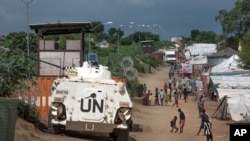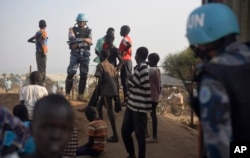A South Sudanese diplomat in the United States says his government canceled the passports of five former officials of the Juba government because they were campaigning for the country to be taken over as a U.N. protectorate.
The former officials had expressed support for a proposed regional protection force to be deployed to South Sudan to quell violence in the country. Ambassador Gordon Buay, who runs diaspora affairs at the South Sudan Embassy in the United States, said a call by any South Sudanese person for a U.N. takeover was an act of treason.
“Any South Sudanese citizens holding passports and joining a rally calling on South Sudan to be taken over by the U.N., that person will lose his passport,” Buay said.
When South Sudan in Focus noted that members of the South Sudanese diaspora were simply expressing their opinions, which does not violate the South Sudan constitution or any laws, Buay responded that such expression was a crime according to the South Sudan criminal court.
“There is freedom of speech, but there is no freedom for you to call for toppling the government of South Sudan and to take it over so that South Sudan will be ruled by the U.N.,” he said.
March near U.N.
Members of the South Sudanese diaspora on Thursday marched near U.N. headquarters in New York City to urge the Security Council to unanimously support the deployment of a third-party force in South Sudan, with a strong mandate to protect its citizens.
Diaspora leaders say South Sudanese residents have paid a heavy price during the 2½-year conflict, and most recently during the fighting that erupted in Juba in July, and believe an outside force will save lives and foster a sense of security in the capital.
South Sudanese native Peter Kuel flew from Seattle to New York to attend the protest. Kuel, who said this was his eighth protest in four years, said it felt different because time is running out.
“People are feeling a very urgent call," he said. "There is an urgent call among people here.”
Kuel said there was no excuse for further inaction on the part of the Security Council, because a humanitarian crisis is unfolding in South Sudan. He and other protesters demanded that the council approve an arms embargo, targeted sanctions and the deployment of an outside force to protect Juba residents. And he dismissed claims by the Salva Kiir administration that the troops would undermine South Sudanese sovereignty.
Peace not a certainty
Ambassador Joseph Moum Malok, deputy permanent representative of South Sudan to the U.N., cautioned protesters to proceed with caution, saying countries where the U.N. has intervened "are not in peace today."
"Maybe [outside forces] managed to remove the regime in those countries, but they did not bring peace," he said. "Let’s see what is happening in Libya. That was intervention of the United Nations, or the so-called intervention force. What happened in Afghanistan — is there peace? Or Iraq? There is nothing like that.”
Angelo Kiassiano said he knew why he was protesting. Kiassano, a representative of the Western Bahr el Ghazal community in the United States, said he took part in the protest because of the years of fighting, the thousands of civilian deaths, and insecurity that has triggered widespread food insecurity across South Sudan. He said South Sudanese soldiers have no interest in protecting civilians.
“So we need a mediator, someone who can come in and help, help the civilians first — that is our first objective," Kiassiano said. "We are not politicians, we are human beings. We feel the pain of our own people. The U.N. has been there for us during the civil war and it is still there for us right now, so we need the continuation of that support and we need to save lives.”
Kassiano said that a third-party force was desperately needed to protect citizens and that any suggestion that the U.N. would try to take over South Sudan was unfounded.
The protesters delivered a letter to the Security Council urging its support for the regional protection force, targeted sanctions and an arms embargo on South Sudan.








